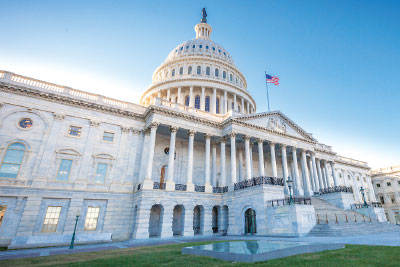Congress Passes Spending Bill With Several APA Priorities
Abstract
The $1.7 trillion omnibus package includes many provisions for which APA heavily advocated, including new investments in the psychiatric workforce, collaborative care, and mental health parity.

In December, Congress passed the Consolidated Appropriations Act of 2023 (HR 2617), a massive spending bill that will keep the U.S. government funded through September.
The package, which President Joe Biden signed on December 29, includes numerous APA priorities for which it has advocated heavily. They include APA initiatives focused on encouraging implementation of the evidence-based Collaborative Care Model (CoCM), enforcing mental health parity, and bolstering the psychiatric workforce.
“These accomplishments as well as many others in the legislation are a great victory for psychiatry and the patients we serve and could not have been achieved without the active engagement of APA members and the dedication of APA staff,” said APA CEO and Medical Director Saul Levin, M.D., M.P.A.
Some of the APA priorities in the package include the following:
Collaborative care: The package includes grants and technical assistance to implement the CoCM in primary care settings for the prevention of mental and substance use disorders (SUD) and early intervention for treatment.
Mental health parity: Grants for state insurance agencies were included in the package to enforce the Mental Health Parity and Addiction Equity Act of 2008 (MHPAEA) and ensure that insurers are complying with the federal parity law. The spending package also eliminates the parity opt-out for non-federal governmental health plans.
Workforce: The package made significant investments in the medical workforce with the creation of 200 new graduate medical education (GME) residency slots, half of which are designated specifically for psychiatry or psychiatric subspecialties.
Telehealth: The package extends the current Medicare telehealth flexibilities instituted due to the ongoing public health emergency. It delays the implementation of the in-person requirement for telehealth services for mental health until December 31, 2024.
APA’s members and staff have initiated many of these provisions and actively advocated for them. In May 2022, in her role at the time as incoming APA President, Rebecca Brendel, M.D., J.D., provided expert testimony to the Subcommittee on Health of the House Committee on Energy and Commerce. She spoke about numerous bills that would bolster the nation’s mental health system, explaining that many insurers are not in compliance with MHPAEA and that Congressional action is needed. She also emphasized the importance of integrating mental and physical health care to enhance access and the need of primary care offices for support so they can implement the CoCM (“Incoming APA President Testifies Before House Subcommittee”).
In addition, APA members and staff engaged congressional offices and deployed a strong grassroots push to encourage congressional action addressing the psychiatry workforce shortage, resulting in the 100 new GME slots reserved for psychiatry. Congress has increased the number of GME slots only twice over the last 25 years.
Other APA-supported provisions within the spending package include investments in health equity. The package increased the authorizations and funding for programs to improve maternal health and for the Substance Abuse and Mental Health Services Administration’s (SAMHSA) Minority Fellowship Program, a program in which APA participates.
Additionally, the package increases funding for critical mental health and SUD programs under SAMHSA; the Centers for Disease Control and Prevention; and the National Institutes of Health, including the National Institute on Minority Health and Health Disparities.
In a statement applauding the package’s passage, APA also emphasized the need for continued work. Congress did not entirely eliminate a cut in Medicare payments for physicians imposed by the Centers for Medicare and Medicaid Services. The cut, which went into effect January 1, was originally slated to be 4.5%, but Congress adjusted it down to 2%. “This runs counter to the need to improve access to care for patients, and we urge Congress to revisit this continuing challenge as soon as possible in the new year,” APA’s statement reads.
“Improving mental health care is critically important for families across the country,” said Sen. Ron Wyden (D-Ore.). “I was proud to fight for measures that will bring more mental health providers into the workforce and boost access through innovations like telehealth. There’s still more work to do, but the accomplishments in this legislation are a promising start for Americans that need mental health care.” ■



